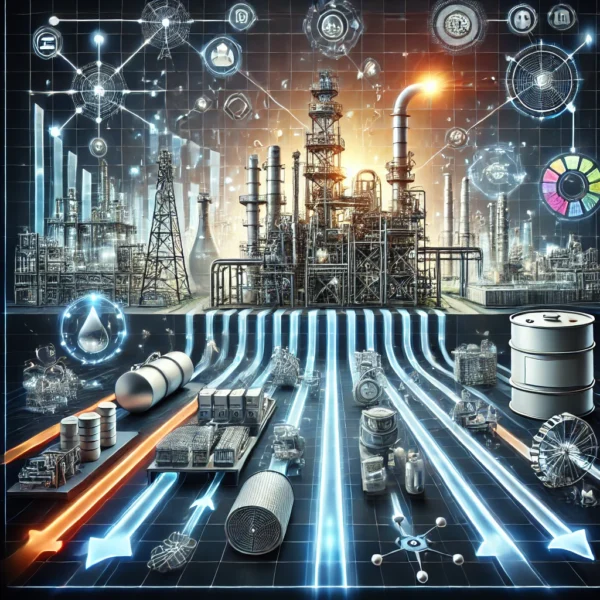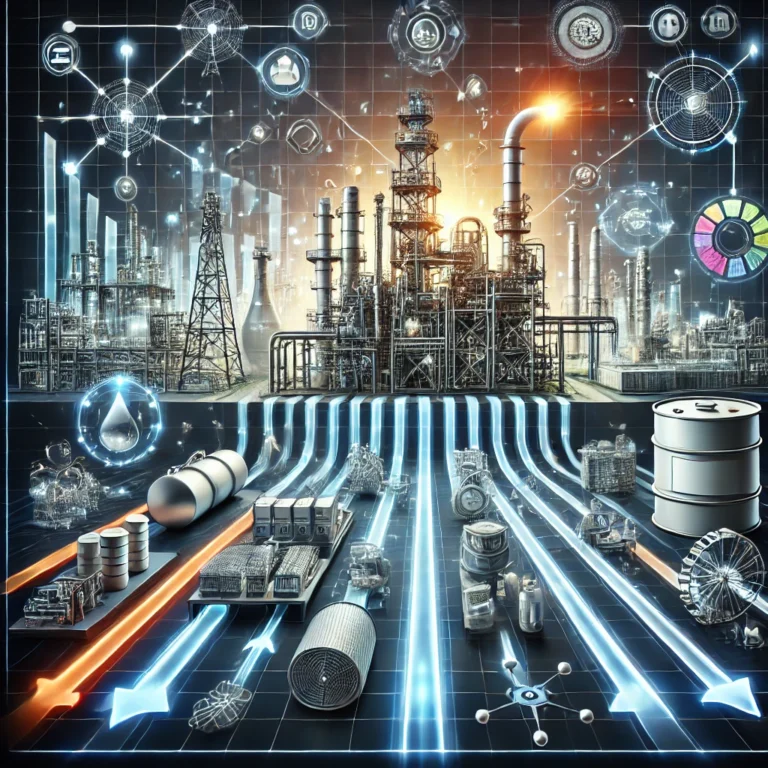Introduction :
The petrochemical industry, as one of the most vital sectors in the energy and raw material supply chain, plays a critical role in the development of downstream industries. Downstream industries use petrochemical products as raw materials to manufacture final goods for consumers. These industries span various fields such as plastics, chemicals, packaging, automotive, textiles, and household appliances. Below is an analysis of the key role the petrochemical industry plays in advancing these industries.
1. Supplying Essential Raw Materials
The petrochemical industry produces various products such as polymers, plastics, basic chemicals, and organic compounds that serve as the main raw materials for downstream industries. For example:
- Polymers: Used in the production of plastic products, automotive components, and household appliances.
- Basic Chemicals: Such as ethylene, propylene, and benzene, used in the manufacturing of detergents, paints, and synthetic fibers.
2. Creating Value Addition
One of the primary advantages of the petrochemical industry is its ability to generate significant value addition by transforming raw materials into usable products for downstream industries. This process not only contributes to economic growth but also fosters technological development and production skills in related industries.
3. Employment and Regional Development
The growth of downstream industries linked to petrochemicals creates numerous job opportunities in production, distribution, and research and development. Additionally, establishing downstream factories near petrochemical units can promote industrial zones and foster economic growth in underdeveloped areas.
4. Reducing Imports and Increasing Exports
The development of downstream industries based on petrochemical products can decrease dependency on imports of finished goods and boost exports of high-value-added products. This strengthens the national economy and creates a positive trade balance.
5. Strengthening the Industrial Supply Chain
The petrochemical industry plays a pivotal role in improving the supply chain of downstream industries by providing sustainable and high-quality raw materials. This collaboration reduces production costs, enhances efficiency, and improves the quality of final products.
6. Supporting Innovation and Technology
Due to their diverse range and extensive chemical capabilities, petrochemical products pave the way for technological advancements in downstream industries. For instance:
- Advanced Polymers: Used in producing lightweight and durable components for the automotive and aerospace industries.
- Specialty Chemicals: For the production of pharmaceuticals, pesticides, and cosmetics.
Challenges and Opportunities
Challenges:
- Fluctuations in Oil and Raw Material Prices: Which can impact production costs and competitiveness.
- Lack of Infrastructure and Technology: In some regions for downstream industry development.
- Environmental Regulations: Which can increase production costs.
Opportunities:
- Investment in Research and Development: To produce high-value-added products.
- Expanding International Collaborations: To access new markets.
- Adopting Green Technologies: To reduce environmental impact and enhance sustainability.
Conclusion :
As a cornerstone of economic development, the petrochemical industry plays a pivotal role in the growth and advancement of downstream industries. From supplying raw materials to creating value addition and generating employment, this industry serves as the foundation of an effective and sustainable production chain. By investing in infrastructure, advancing technology, and leveraging global opportunities, the potential of this industry can be harnessed to revolutionize downstream industries.




